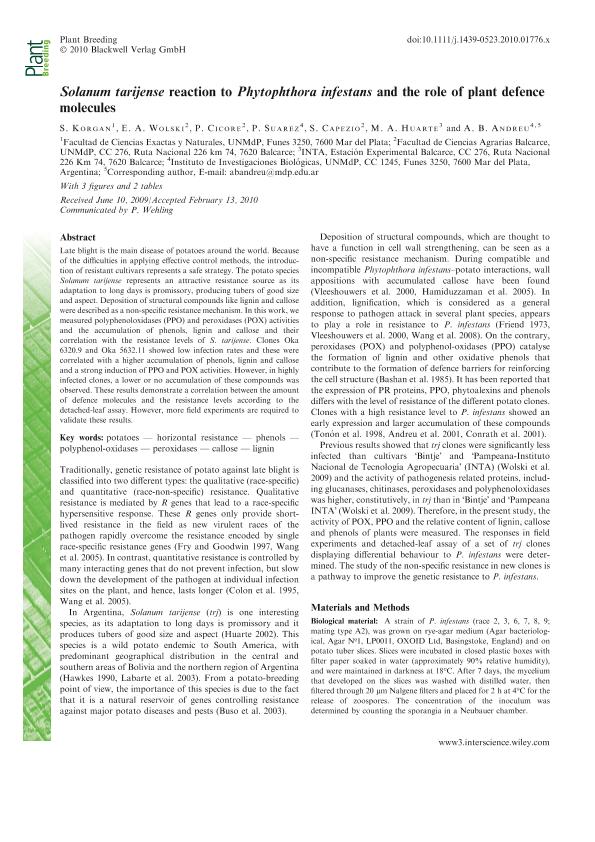Artículo
Solanum tarijense reaction to P. infestans and the role of plant defense molecules
Korgan, Samanta ; Wolski, Erika Alejandra
; Wolski, Erika Alejandra ; Cicore, Pablo Leandro; Suarez, Patricia Alejandra
; Cicore, Pablo Leandro; Suarez, Patricia Alejandra ; Capezio, Silvia Beatriz; Huarte, Marcelo Atilio; Andreu, Adriana Balbina
; Capezio, Silvia Beatriz; Huarte, Marcelo Atilio; Andreu, Adriana Balbina
 ; Wolski, Erika Alejandra
; Wolski, Erika Alejandra ; Cicore, Pablo Leandro; Suarez, Patricia Alejandra
; Cicore, Pablo Leandro; Suarez, Patricia Alejandra ; Capezio, Silvia Beatriz; Huarte, Marcelo Atilio; Andreu, Adriana Balbina
; Capezio, Silvia Beatriz; Huarte, Marcelo Atilio; Andreu, Adriana Balbina
Fecha de publicación:
06/2010
Editorial:
Wiley Blackwell Publishing, Inc
Revista:
Plant Breeding
ISSN:
0179-9541
Idioma:
Inglés
Tipo de recurso:
Artículo publicado
Clasificación temática:
Resumen
Late blight is the main disease of potatoes around the world. Because of the difficulties in applying effective control methods, the introduction of resistant cultivars represents a safe strategy. The potato species Solanum tarijense represents an attractive resistance source as its adaptation to long days is promissory, producing tubers of good size and aspect. Deposition of structural compounds like lignin and callose were described as a non‐specific resistance mechanism. In this work, we measured polyphenoloxidases (PPO) and peroxidases (POX) activities and the accumulation of phenols, lignin and callose and their correlation with the resistance levels of S. tarijense. Clones Oka 6320.9 and Oka 5632.11 showed low infection rates and these were correlated with a higher accumulation of phenols, lignin and callose and a strong induction of PPO and POX activities. However, in highly infected clones, a lower or no accumulation of these compounds was observed. These results demonstrate a correlation between the amount of defence molecules and the resistance levels according to the detached‐leaf assay. However, more field experiments are required to validate these results.
Palabras clave:
Solanum tarijense
,
P. infestans
,
defense molecules
Archivos asociados
Licencia
Identificadores
Colecciones
Articulos(IIB)
Articulos de INSTITUTO DE INVESTIGACIONES BIOLOGICAS
Articulos de INSTITUTO DE INVESTIGACIONES BIOLOGICAS
Citación
Korgan, Samanta; Wolski, Erika Alejandra; Cicore, Pablo Leandro; Suarez, Patricia Alejandra; Capezio, Silvia Beatriz; et al.; Solanum tarijense reaction to P. infestans and the role of plant defense molecules; Wiley Blackwell Publishing, Inc; Plant Breeding; 130; 2; 6-2010; 231-236
Compartir
Altmétricas



